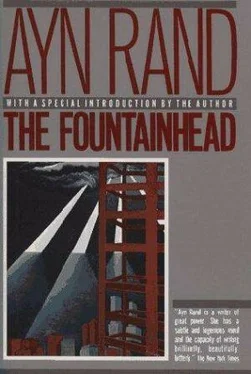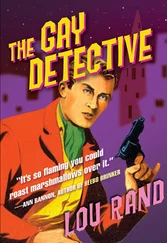The presses stopped.
Toohey jerked back, automatically, before he knew why he had jerked: he was a newspaperman and it was a sound that did not stop like that.
Wynand looked at his wrist watch. He said:
"It's nine o'clock. You're out of a job, Mr. Toohey. The Banner has ceased to exist."
The next incident of reality Toohey apprehended was his own hand dropping down on the typewriter keys: he heard the metal cough of the levers tangling and striking together, and the small jump of the carriage.
He did not speak, but he thought his face was naked because he heard Wynand answering him:
"Yes, you had worked here for thirteen years ... Yes, I bought them all out, Mitchell Layton included, two weeks ago ... " The voice was indifferent. "No, the boys in the city room didn't know it. Only the boys in the pressroom ... "
Toohey turned away. He picked up a paper clip, held it on his palm, then turned his hand over and let the clip fall, observing with mild astonishment the finality of the law mat had not permitted it to remain on his downturned palm.
He got up. He stood looking at Wynand, a stretch of gray carpet between them.
Wynand's head moved, leaned slightly to one shoulder. Wynand's face looked as if no barrier were necessary now, it looked simple, it held no anger, the closed lips were drawn in the hint of a smile of pain that was almost humble.
Wynand said:
"This was the end of the Banner ... I think it's proper that I should meet it with you."
Many newspapers bid for the services of Ellsworth Monkton Toohey. He selected the Courier, a paper of well-bred prestige and gently uncertain policy.
In the evening of his first day on the new job Ellsworth Toohey sat on the edge of an associate editor's desk and they talked about Mr. Talbot, the owner of the Courier, whom Toohey had met but a few times.
"But Mr. Talbot as a man?" asked Ellsworth Toohey. "What's his particular god? What would he go to pieces without?"
In the radio room across the hall somebody was twisting a dial. "Time," blared a solemn voice, "marches on!"
Roark sat at the drafting table in his office, working. The city beyond the glass walls seemed lustrous, the air washed by the first cold of October.
The telephone rang. He held his pencil suspended in a jerk of impatience; the telephone was never to ring when he was drawing. He walked to his desk and picked up the receiver.
"Mr. Roark," said his secretary, the tense little note in her voice serving as apology for a broken order, "Mr. Gail Wynand wishes to know whether it would be convenient for you to come to his office at four o'clock tomorrow afternoon?"
She heard the faint buzz of silence in the receiver at her ear and counted many seconds.
"Is he on the wire?" asked Roark. She knew it was not the phone connection that made his voice sound like that.
"No, Mr. Roark. It's Mr. Wynand's secretary."
"Yes. Yes. Tell her yes."
He walked to the drafting table and looked down at the sketches; it was the first desertion he had ever been forced to commit: he knew he would not be able to work today. The weight of hope and relief together was too great.
When Roark approached the door of what had been the Banner Building, he saw that the sign, the Banner's masthead, was gone. Nothing replaced it. A discolored rectangle was left over the door. He knew the building now contained the offices of the Clarion and floors of empty rooms. The Clarion, a third-rate afternoon tabloid, was the only representative of the Wynand chain in New York.
He walked to an elevator. He was glad to be the only passenger: he felt a sudden, violent possessiveness for the small cage of steel; it was his, found again, given back to him. The intensity of the relief told him the intensity of the pain it had ended; the special pain, like no other in his life.
When he entered Wynand's office, he knew that he had to accept that pain and carry it forever, mat there was to be no cure and no hope. Wynand sat behind his desk and rose when he entered, looking straight at him. Wynand's face was more than the face of a stranger: a stranger's face is an unapproached potentiality, to be opened if one makes the choice and effort; this was a face known, closed and never to be reached again. A face that held no pain of renunciation, but the stamp of the next step, when even pain is renounced. A face remote and quiet, with a dignity of its own, not a living attribute, but the dignity of a figure on a medieval tomb that speaks of past greatness and forbids a hand to reach out for the remains.
"Mr. Roark, this interview is necessary, but very difficult for me. Please act accordingly."
Roark knew that the last act of kindness he could offer was to claim no bond. He knew he would break what was left of the man before him if he pronounced one word: Gail. Roark answered: "Yes, Mr. Wynand."
Wynand picked up four typewritten sheets of paper and handed them across the desk:
"Please read this and sign it if it meets with your approval."
"What is it?"
"Your contract to design the Wynand Building." Roark put the sheets down. He could not hold them. He could not look at them.
"Please listen carefully, Mr. Roark. This must be explained and understood. I wish to undertake the construction of the Wynand Building at once. I wish it to be the tallest structure of the city. Do not discuss with me the question of whether this is timely or economically advisable. I wish it built. It will be used — which is all that concerns you. It will house the Clarion and all the offices of the Wynand Enterprises now located in various parts of the city. The rest of the space will be rented. I have sufficient standing left to guarantee that. You need have no fear of erecting a useless structure. I shall send you a written statement on all details and requirements. The rest will be up to you. You will design the building as you wish. Your decisions will be final. They will not require my approval. You will have full charge and complete authority. This is stated in the contract. But I wish it understood that I shall not have to see you. There will be an agent to represent me in all technical and financial matters. You will deal with him. You will hold all further conferences with him. Let him know what contractors you prefer chosen for the job. If you find it necessary to communicate with me, you will do it through my agent. You are not to expect or attempt to see me. Should you do so, you will be refused admittance. I do not wish to speak to you. I do not wish ever to see you again. If you are prepared to comply with these conditions, please read the contract and sign it."
Roark reached for a pen and signed without looking at the paper.
"You have not read it," said Wynand.
Roark threw the paper across the desk.
"Please sign both copies."
Roark obeyed.
"Thank you," said Wynand, signed the sheets and handed one to Roark. "This is your copy."
Roark slipped the paper into his pocket.
"I have not mentioned the financial part of the undertaking. It is an open secret that the so-called Wynand empire is dead. It is sound and doing as well as ever throughout the country, with the exception of New York City. It will last my lifetime. But it will end with me. I intend to liquidate a great part of it. You will, therefore, have no reason to limit yourself by any consideration of costs in your design of the building. You are free to make it cost whatever you find necessary. The building will remain long after the newsreels and tabloids are gone."
"Yes, Mr. Wynand."
"I presume you will want to make the structure efficiently economical in maintenance costs. But you do not have to consider the return of the original investment. There's no one to whom it must return."
"Yes, Mr. Wynand."
Читать дальше










